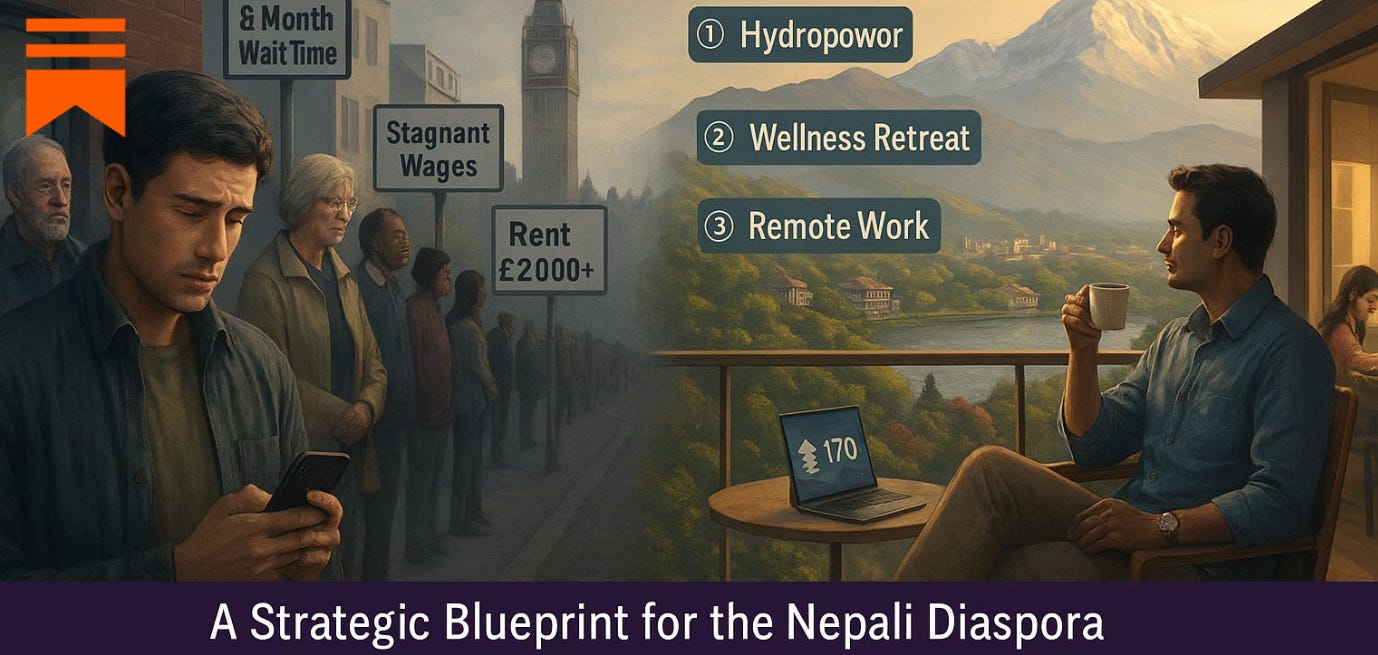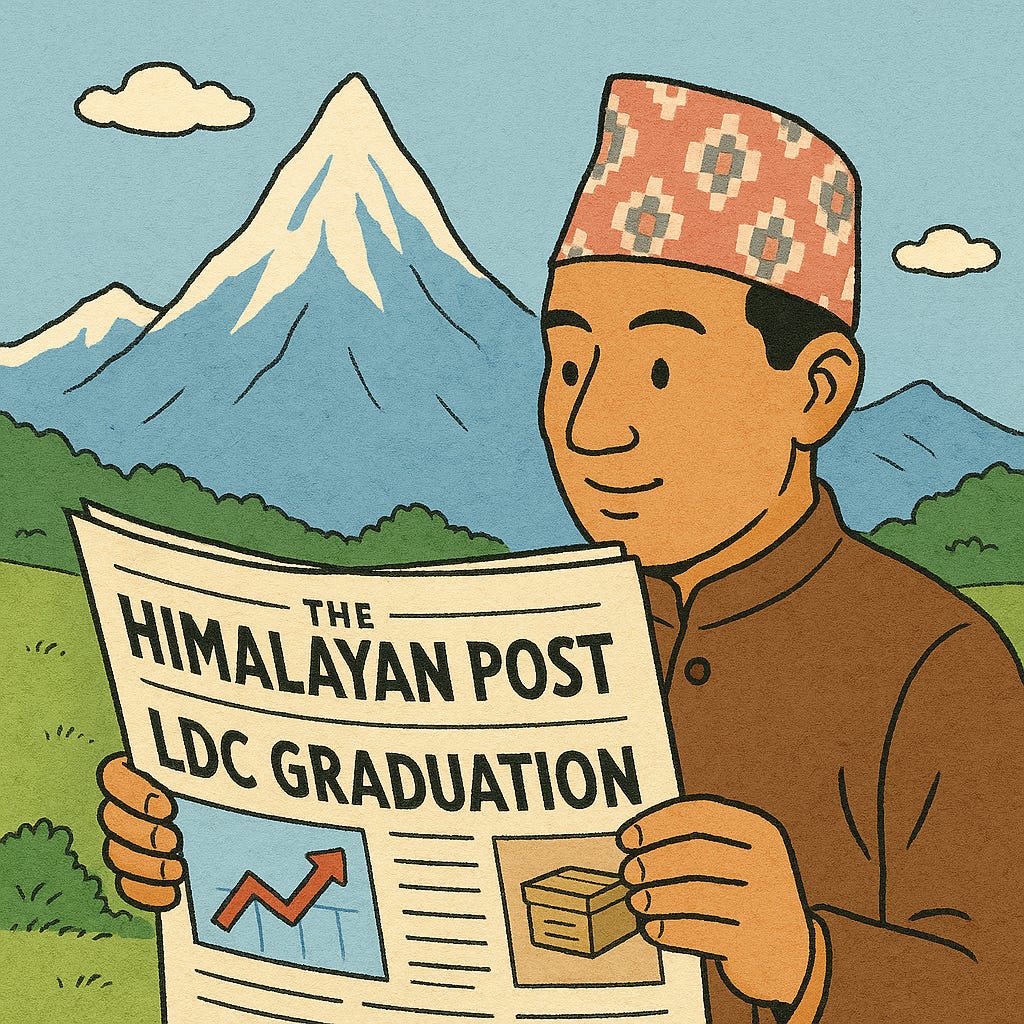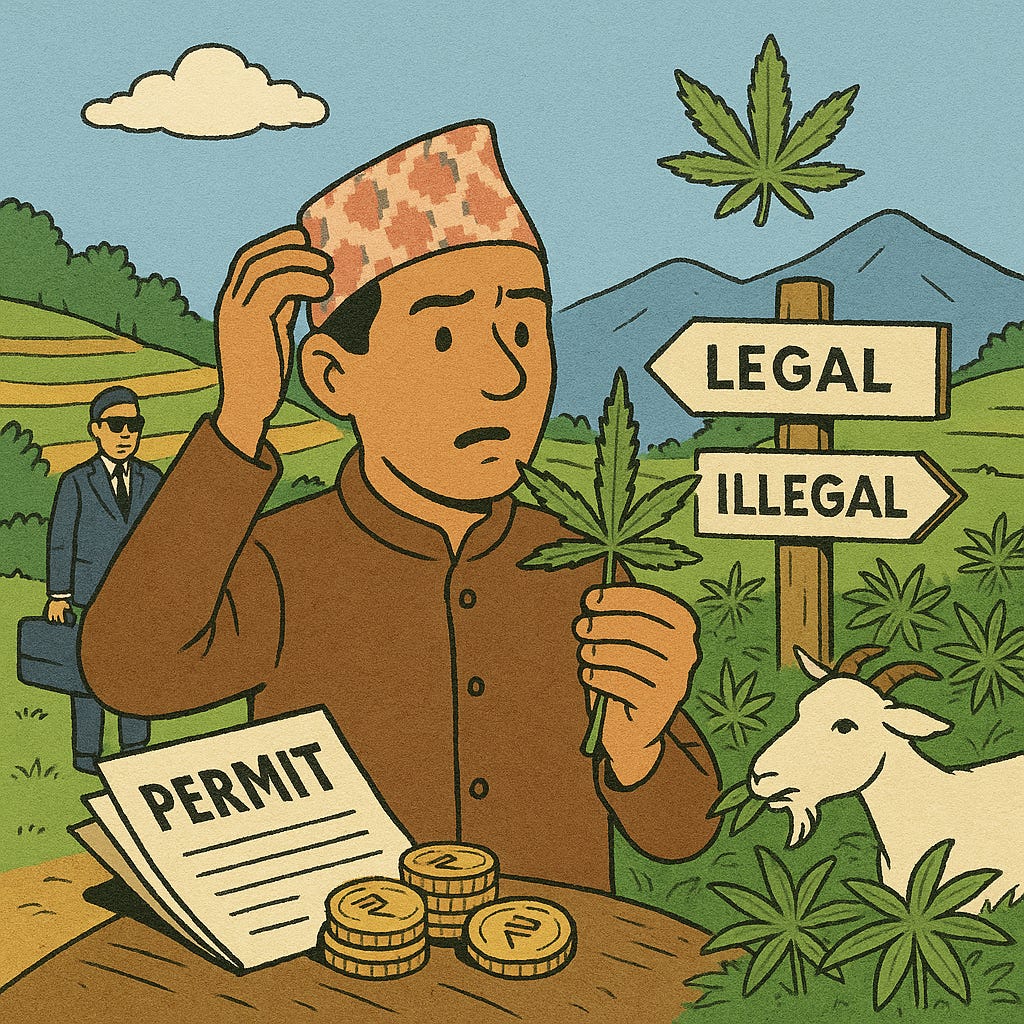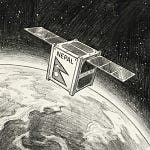Share the love! Help others that care about Nepal stay up to date the easy way. If you like this issue, share it with a friend who follows Nepal and hit Subscribe for your weekly dose of curated, can’t-miss updates.
Nepal’s juggling a proud upgrade and a few pesky speed bumps this week — graduation from LDC status, fresh hydropower deals and infrastructure investments offer real upside, even as food‑import shocks, market jitters and price pain remind us the transition won’t be painless. We’re leading with a timely guest essay by Saurav Sharma — a diaspora‑focused playbook on turning a rare window of favourable conditions and sector openings into long‑term bets back home — because this issue is for Nepalis who want to act, not just watch.
Queue in London or a Penthouse in Nepal?
Guest Essay by Saurav Sharma
The NHS Queue or a Penthouse in Nepal? As the sun sets in the West, can we rise with the dawn back home? This moment may be our last great window — the pound is at a near-historic high, but not for long. In this timely blueprint, Saurav Sharma urges the Nepali diaspora to act before the tide turns. From IT and hydropower to wellness tourism, Nepal is quietly entering a decade of opportunity. The question is: will we lead, or watch from afar?
Economy & Development 💸
This diaspora‑driven momentum arrives as Nepal approaches a defining economic milestone: graduation from Least Developed Country (LDC) status.
Nepal is on track to graduate from the United Nations’ Least‑Developed Country (LDC) category on 24 November 2026, a major milestone that reflects decades of progress but brings immediate policy imperatives. The MyRepublica briefing explains the technical thresholds (GNI per capita, Human Assets Index and Economic & Environmental Vulnerability) and the government’s Smooth Transition Strategy, which lists 167 targeted actions across macroeconomic stability, human capital and climate resilience. Graduation will remove LDC concessions and could raise export costs (one estimate cites a potential ~4.3% dip in projected exports), so timely measures—strengthening productive capacity, finalising key trade agreements, activating the proposed steering and monitoring committees, and scaling social safety nets—are essential to make the transition smooth and irreversible.
At the same time, Nepal’s external vulnerabilities are growing: the country’s food import bill jumped to Rs 360 billion in FY 2024–25, driven mainly by edible‑oil and cereal imports after India eased export curbs, a trend reported by the KTM Post. The surge underscores how subsidised cross‑border supplies and tariff arrangements can undercut local producers and widen the trade deficit; experts argue that boosting domestic agriculture, improving value chains and revisiting trade rules under SAFTA are urgent priorities to enhance food security and reduce dependence on volatile external supplies.
Other signals show simultaneous opportunity and strain. Financial closures for the 216 MW Upper Seti and the Rs 70 billion commitment for the 341 MW Budhigandaki project underline growing private‑sector momentum in hydropower, and the NEA’s planned US$320 million investment in high‑capacity transmission lines aims to address recurring load‑shedding (all reported by MyRepublica). Yet infrastructure delivery remains uneven: the Narayangadh‑Butwal road expansion has been extended to July 2026 (THT), the stock market corrected sharply with roughly Rs 101 billion in paper losses (MyRepublica), consumer prices showed pressure (chicken reached Rs 335/kg), and tourism at Rara Lake continues to be constrained by poor amenities despite rising visitor numbers (KTM Post). Together these stories underscore that graduation can be a launchpad for transformation—if policy, investment and implementation move in step.
Social & Cultural ⭐
Bagmati has been declared a fully immunized province, with all 13 districts and 119 local units meeting the criteria and a digital health programme launched at a ceremony attended by the prime minister (MyRepublica). At the same time health officials are warning of localized outbreaks — Chitwan recorded 20 dengue and 32 scrub-typhus cases in 15 days — and urging community-level prevention like cleanliness and repellents (THT). This progress sits alongside a worrying long-term trend: non-communicable diseases (cardiovascular, respiratory and cancers) account for a growing share of deaths in Nepal, underscoring that wins in childhood vaccination must be matched by sustained investments in chronic disease prevention and treatment (RisingNepal).
The Gandaki provincial government has drafted a proposal to legalize and tightly regulate marijuana farming, requiring majority Nepali ownership and a layered licensing regime that ranges from modest application fees to multi-million-rupee processing and testing permits — a move that could reshape local agriculture and industry if approved (RisingNepal). The draft also emphasizes age limits, strict sales channels and significant upfront investment, signaling the province’s intent to control the market while opening new revenue and research pathways.
Elsewhere, an AI-powered landslide early-warning pilot that combines local rain gauges, photos and satellite data aims to give communities weeks of lead time in high-risk areas — a low-cost, locally driven resilience experiment to watch this monsoon (MyRepublica). The season’s strain on rural livelihoods is also visible in the plains, where desperate farmers illegally “hooking” mains for irrigation have led to dozens of electrocution deaths, highlighting gaps in access and safety (KTM Post). On the softer side of the week, the National Examination Board released Grade XII results and Nepal marked 70 years of diplomacy with China, reminders that education milestones and long‑term ties continue alongside these urgent public‑health and climate challenges (THT; MyRepublica).
Politics & Governance 🏛️
New Delhi is dispatching Foreign Secretary Vikram Misri to Kathmandu on August 17 to lay the groundwork for Prime Minister KP Sharma Oli’s tentative India visit (currently slated to begin September 16), according to KTM Post. Talks will aim to finalise the visit agenda, possible instruments such as a mutual legal assistance (MLA) agreement and plans for travel beyond Delhi, building on recent home‑secretary talks and the Boundary Working Group meeting that sought to advance long‑pending border work.
Back home, Deputy PM and Finance Minister Bishnu Prasad Paudel has ordered secretaries to draft an action plan and strictly implement the annual budget, pressing for measurable results and signalling tighter oversight from the Finance Ministry, reports Rising Nepal. Expect closer monitoring, stronger enforcement and possible reallocation if agencies fail to meet delivery targets as Kathmandu pushes to accelerate project rollout this fiscal year.
Let’s connect
Enjoying this issue? 📩 Share it with a friend & let’s keep Nepalis worldwide in the loop! Got thoughts? Hit reply—we’re all ears! Or let us know what you think via our Feedback form or follow us on Facebook | LinkedIn
P.S. Got a story or issue you'd like us to cover next week? Drop us a reply — we're building this space together.
About Nepali Diaspora Digest:
The Nepali Diaspora Digest connects the global Nepali community with curated news, insights, and stories that matter most. Join us as we celebrate and explore the diverse voices and achievements of Nepalis worldwide.
Partner shout out
belayat.uk: helping Nepalis connect in the UK on jobs, housing, events and finding local Nepali owned businesses
















